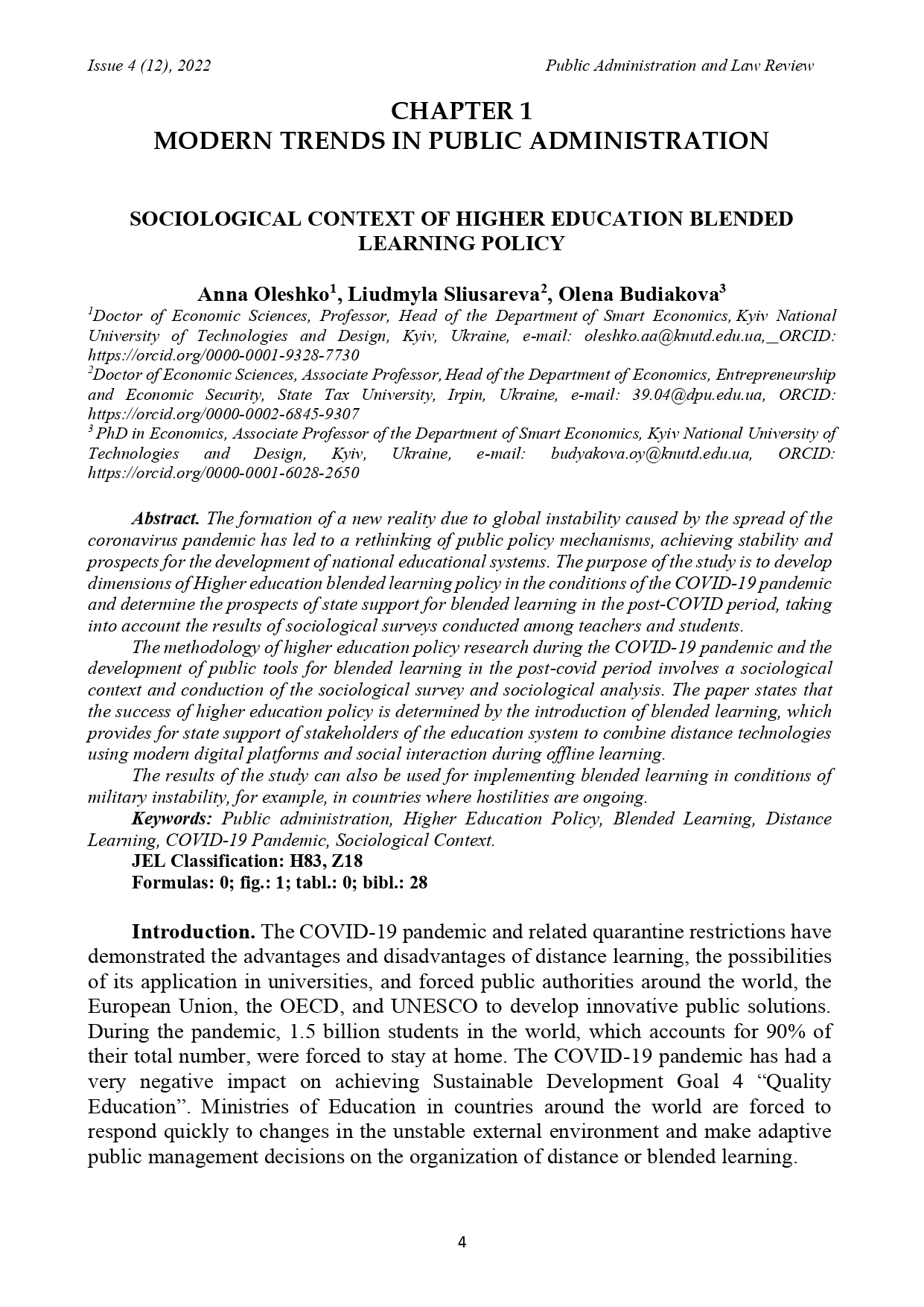SOCIOLOGICAL CONTEXT OF HIGHER EDUCATION BLENDED LEARNING POLICY
DOI:
https://doi.org/10.36690/2674-5216-2022-4-4Keywords:
Public administration, Higher Education Policy, Blended Learning, Distance Learning, COVID-19 Pandemic, Sociological ContextAbstract
The formation of a new reality due to global instability caused by the spread of the coronavirus pandemic has led to a rethinking of public policy mechanisms, achieving stability and prospects for the development of national educational systems. The purpose of the study is to develop dimensions of Higher education blended learning policy in the conditions of the COVID-19 pandemic and determine the prospects of state support for blended learning in the post-COVID period, taking into account the results of sociological surveys conducted among teachers and students.
The methodology of higher education policy research during the COVID-19 pandemic and the development of public tools for blended learning in the post-covid period involves a sociological context and conduction of the sociological survey and sociological analysis. The paper states that the success of higher education policy is determined by the introduction of blended learning, which provides for state support of stakeholders of the education system to combine distance technologies using modern digital platforms and social interaction during offline learning.
The results of the study can also be used for implementing blended learning in conditions of military instability, for example, in countries where hostilities are ongoing.
Downloads
References
Al-Freih, M. (2021). The Impact of Faculty Experience with Emergency Remote Teaching: An Interpretive Phenomenological Study. IAFOR Journal of Education, 9(2), 7-23.
Andres, L. (2012). Designing and doing survey research. Sage.
Bastedo, M. N. (2007). 10 Sociological Frameworks for Higher Education Policy Research. Sociology of higher education: Contributions and their contexts, 295.
Brammer S., Clark Т. (2020). COVID-19 and Management Education: Reflections on Challenges, Opportunities, and Potential Futures. British Journal of Management, 31, 453-456. https://doi.org/10.1111/1467-8551.12425
Bozkurt, A. (2022). Resilience, Adaptability, and Sustainability of Higher Education: A systematic Mapping Study on the Impact of the Coronavirus (Covid-19) Pandemic and the Transition to the New Normal. Journal of Learning for Development, 9(1), 1-16. https://doi.org/10.56059/jl4d.v9i1.590
Cairney, P. (2019). Understanding public policy: theories and issues. Bloomsbury Publishing.
Creswell, J. W. (2009). Research design: qualitative, quantitative, and mixed methods approaches. 3rd ed. Los Angeles, Sage.
Global Chinese Learning Platform established in Qingdao. (2021). In Ministry of Education of the People’s Republic of China. http://en.moe.gov.cn/news/press_releases/202012/t20201222_506987.html
International Commission on the Futures of Education. (2020, June 22). Education in a post-COVID world: Nine ideas for public action. https://en.unesco.org/news/education-post-covid-world-nine-ideas-public-action
Leal Filho, W., Price, E., Wall, T. et al. (2021). COVID-19: the impact of a global crisis on sustainable development teaching. Environment, Development and Sustainablitiy, 23, 11257–11278. https://doi.org/10.1007/s10668-020-01107-z
Learning cities: Drivers of inclusion and sustainability (2020). In UNESCO Institute for Lifelong Learning. https://uil.unesco.org/lifelong-learning/learning-cities/learning-cities-drivers-inclusion-and-sustainability
Ministry of Education: Use the online to suspend classes without stopping school (2020) In China Education News. http://www.moe.gov.cn/jyb_xwfb/s5147/202002/t20200203_417488.html
Navarro-Espinosa, J.A.; Vaquero-Abellán, M.; Perea-Moreno, A.-J.; Pedrós-Pérez, G.; Aparicio-Martínez, P.; Martínez-Jiménez, M.P. (2021). The Higher Education Sustainability before and during the COVID-19 Pandemic: A Spanish and Ecuadorian Case. Sustainability, 13, 6363. https://doi.org/10.3390/su13116363
OECD (2020, September 8). Education at a Glance 2020: Why the data is crucial during the COVID-19 crisis. https://oecdedutoday.com/education-at-a-glance-2020-why-data-crucial-covid-19/
Oleshko, А., Rovnyagin, A. and Godz, V. (2021). Improving distance learning in the context of pandemic restrictions in higher education. Derzhavne upravlinnya: udoskonalennya ta rozvytok, 1. http://www.dy.nayka.com.ua/?op=1&z=1936. https://doi.org/ 10.32702/2307-2156-2021.1.3
Organisation for Economic Co-operation and Development (2020, October 28-29). A strong, resilient, inclusive and sustainable recovery from COVID-19. Meeting of the Council at Ministerial Level. https://www.oecd.org/newsroom/2020-ministerial-council-statement-a-strong-resilient-inclusive-and-sustainable-recovery-from-covid-19.htm
QS Quacquarelli Symonds (Firm). (2020). How COVID-19 is Impacting Prospective International Students across the Globe. http://hdl.handle.net/10919/98431
Sykes, G., Schneider, B., & Plank, D.N. (Eds.). (2009). Handbook of Education Policy Research (1st ed.), 1064. https://doi.org/10.4324/9780203880968
UNDP (2020, December 15). Human Development Report 2020. The next frontier Human development and the Anthropocene. https://hdr.undp.org/content/human-development-report-2020
UNDESA (2020, July 13). Sustainable Development Outlook 2020: Achieving SDGs in the wake of COVID-19: Scenarios for policymakers. https://www.un.org/development/desa/dpad/publication/sustainable-development-outlook-2020-achieving-sdgs-in-the-wake-of-covid-19-scenarios-for-policymakers/
UNESCO Institute for Lifelong Learning. (2020, June). 2019 Annual Report. https://uil.unesco.org/uils-annual-report-2019
UNESCO (2020, April 8). COVID-19: Learning cities on the front. https://en.unesco.org/news/ covid-19-learning-cities-front-line
United Nations Development Programme (2021). 2020 Annual Report. https://annualreport.undp.org/
U-Multirank (2020, June 9). About 60% of universities reported online learning provisions in their strategic planning pre-COVID-19, but only a few appeared to be prepared for a quick shift to online programs. https://www.umultirank.org/press-media/press-releases/about-60-percent-of-universities-reported-online-learning-provisions-in-their-strategic-planning-pre-covid-19/
Viennet, R., & Pont, B. (2017). Education Policy Implementation: A Literature Review and Proposed Framework. OECD Education Working Papers, No. 162. OECD Publishing.
Watson, J. (2008). Blended Learning: The Convergence of Online and Face-to-Face Education. Promising Practices in Online Learning. North American Council for Online Learning. https://docs.edtechhub.org/lib/5YJCZ5U6
World Bank (2020). Realizing the Future of Learning: From Learning Poverty to Learning for Everyone, Everywhere (Washington, D.C.: World Bank Group).
Zhang, W., Wang, Y., Yang, L., & Wang, C. (2020). Suspending classes without stopping learning: China’s education emergency management policy in the COVID-19 outbreak. Journal of Risk and financial management, 13(3), 55. https://doi.org/10.3390/jrfm13030055

Downloads
Published
How to Cite
Issue
Section
License
Copyright (c) 2022 Anna Oleshko, Liudmyla Sliusareva, Оlena Budіakova

This work is licensed under a Creative Commons Attribution 4.0 International License.





